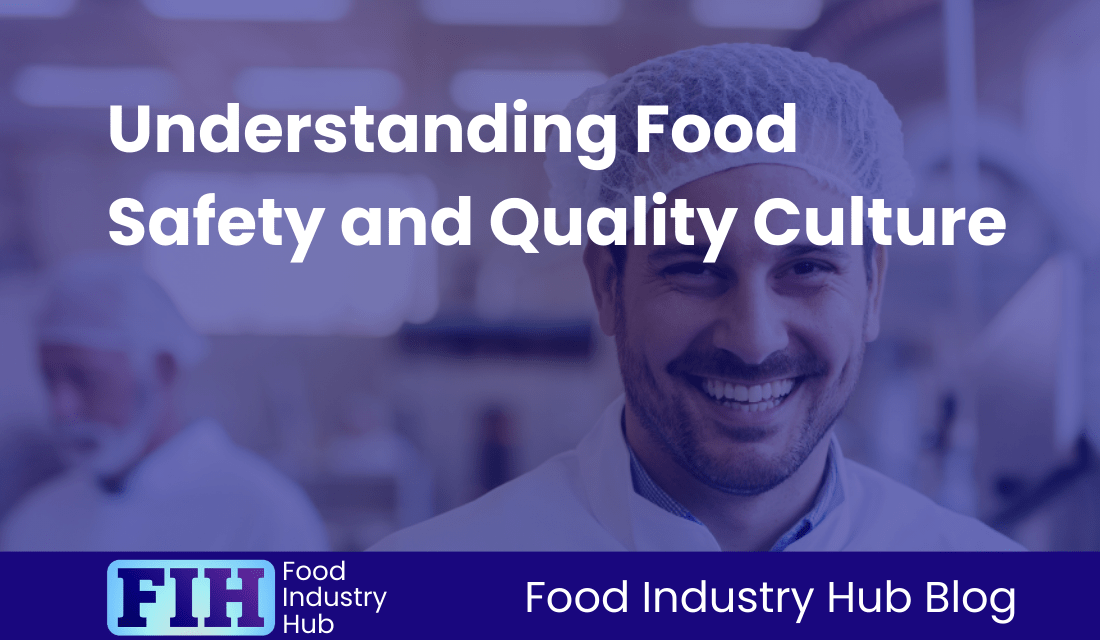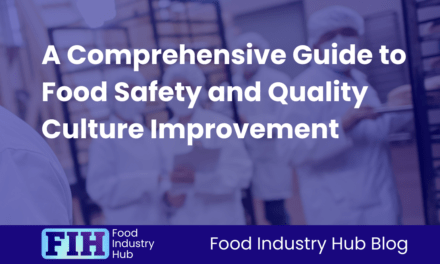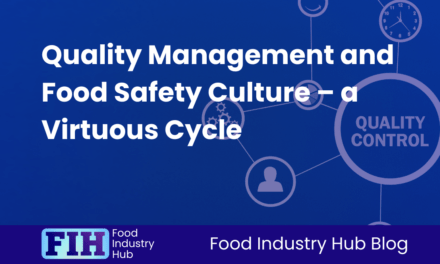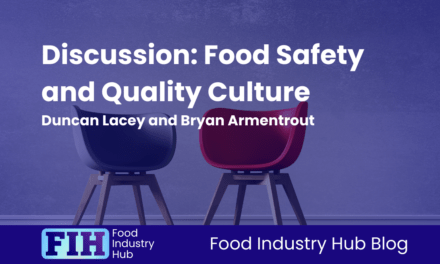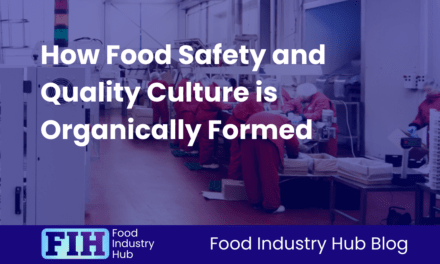Introduction
Food safety and quality culture is an interesting subject, and distinct from many operational concerns in that it directly addresses psychological topics – which is unfamiliar terrain for many in the food industry.
In this post, we’ll look at organisational culture and how food safety and quality culture fits into it. We’ll explore attitudes, behaviours, and interactions with the internal culture. We’ll also address the relationship between food safety and quality culture and compliance with management structures, as well as the significance of culture of food safety and quality performance.
This post is part of a collection we’ve put together to explore the topic of food safety and quality culture, and you can explore the topic in more detail by browsing the related content.
Table of Contents
○ What is Organisational Culture?
○ What is Food Safety and Quality Culture?
○ Values, Attitudes, Behaviours and Culture
○ Influence Of Culture on Individual Attitudes and Behaviours
○ Culture and Compliance
○ Elements of a Strong Food Safety and Quality Culture
○ Importance of Food Safety and Quality Culture
○ FAQ
○ In Summary
What is Organisational Culture?
Organisational culture refers to the values, beliefs, and behaviours that shape the way individuals within a company interact with each other and with external stakeholders. It is like the DNA of an organisation, influencing every aspect of its operations. The culture of an organisation can be seen in how employees communicate, make decisions, and solve problems. It sets the tone for the entire workplace environment.
Organisational culture influences how employees think, feel, and act in their daily work. While it may seem intangible at first glance, organisational culture plays a crucial role in shaping employee behaviour and ultimately impacting operations and performance.
Culture has a significant influence over the way people behave and the choices they make. Social pressure, management interactions, priorities, and competing interests all work to influence the way individuals and groups act, and every organisation has an internal culture.
What is Food Safety and Quality Culture?
Food safety and quality culture is a critical subset of an organisation’s overall culture. It encompasses the beliefs, values, attitudes, and behaviours of employees with regard to ensuring the safety and quality of food products. A strong food safety and quality culture is essential for preventing foodborne illnesses, protecting consumers, maintaining regulatory compliance, and safeguarding an organisation’s reputation. By fostering a strong food safety and quality culture, organisations ensure that everyone from top management to frontline workers are committed to upholding the highest standards in these areas.
It’s useful to think of organisational culture as referring to the totality of cultural expressions within a business, and food safety and quality culture as referring to the sub-set of culture that directly or indirectly impacts food safety and quality practices and behaviours.
If people value food safety and quality, they will form attitudes that reflect those values. In making decisions, the actions will reflect the attitudes – which will be protective of food safety and quality. When people hold themselves accountable to food safety and quality values, you see that reflected in their actions.
Food safety and quality culture works synergistically with documented quality management system. While food safety and quality culture refers to behavioural aspects such as attitudes, beliefs, and values within an organisation, a management system provides the structure and framework necessary for consistent operations.
Documented management systems serve as blueprints for effectively managing food safety and quality processes. They outline procedures, responsibilities, standards, and goals that need to be met on a regular basis. By incorporating food safety and quality culture into these systems, organisations can foster a positive environment where employees prioritise safe practices at every level of operation.
The synergy between food safety and quality culture with documented management systems has numerous benefits. It not only ensures compliance with regulatory requirements but also promotes continuous improvement in all areas of food production. The integration of both elements allows organisations to proactively identify potential risks or areas for improvement in their processes while cultivating a sense of responsibility among employees towards delivering safe products to consumers.
Overall, it is important to recognise that merely having a documented management system is not enough; it must be supported by a strong emphasis on food safety and quality culture within an organisation’s workforce. The collaboration between these two factors sets the foundation for successful implementation of safe practices throughout the entire value chain- from procurement to distribution- ultimately ensuring consumer confidence in the products they purchase.
Significantly, documented management structures tell people what to do, and how to do it – while values and attitudes determine whether or not those instructions are followed. A strong culture amplifies the effectiveness of management systems, while a conflicted culture would act as a rate-limiter for any management intervention.
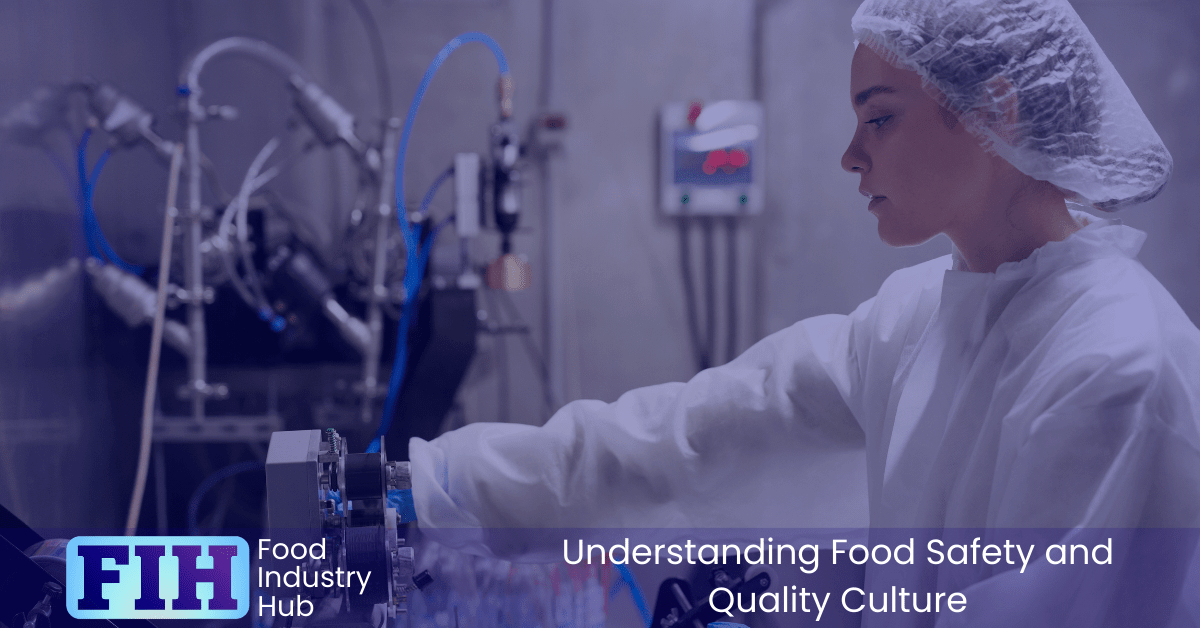
Sign-up for the Food Industry Hub Mail Service
We regularly produce new content for food industry professionals, and the Food Industry Hub Mail Service is the best way to stay up to date with the latest additions.
Signup today to be added to the Food Industry Hub mailing list.
Values, Attitudes, Behaviours and Culture
Attitudes and culture play a crucial role in shaping food safety and quality practices within an organisation. Attitude refers to the way individuals think, feel, and behave towards food safety measures, while culture refers to the shared values, beliefs, and norms that exist within a group or society. Both attitudes and culture can have a profound impact on the overall effectiveness of food safety programs.
It’s useful to think about things in a cause-and-effect narrative:
Values shape attitudes, and attitudes are expressed in behaviours.
Let’s say someone values food safety and quality, and they recognise that personal hygiene is protective of safety and quality. It’s likely that they’ll have a positive disposition toward washing their hands, and that they will express the behaviour of hand-washing.
Conversely, someone could strongly value their own personal comfort, and intentionally wear their PPE incorrectly (for example, not covering their face with a beard snood) despite having a positive disposition/attitude toward food safety and quality – because they were motivated by their personal comfort, which was the strongest-held value.
In many organisations, there is often a disconnect between management’s expectations regarding food safety and the attitude of employees on the ground. This divide can be detrimental to achieving high standards of food safety and quality. It is therefore important for management to foster a positive attitude towards food safety by creating a culture that emphasises its importance at all levels of the organisation. When employees understand that their actions have direct implications on public health, they are more likely to take ownership of their responsibilities and consistently adhere to proper procedures.
Creating strong attitudes towards food safety requires not only changes in individual behaviour but also broader shifts in organisational culture.
Behaviours are influenced by culture, but they also shape it. In terms of food safety and quality, behaviours such as attention to detail, adherence to standard operating procedures, effective communication, and a willingness to learn all contribute to building a positive culture surrounding these important aspects. These behaviours need to be reinforced through continuous training, clear expectations, and recognition for those who consistently exhibit them. Similarly, addressing any negative behaviours that may undermine food safety or compromise product quality is crucial in maintaining a strong culture that prioritises these areas.
By understanding how behaviours are shaped by culture – while also recognising their impact on cultivating a strong cultural foundation – organisations can create environments that prioritise food safety and maximise product quality at every level of operation.
Attitudes, behaviours, and culture play a crucial role in shaping the overall food safety and quality practices within an organisation. It is not enough to simply have robust processes and procedures in place; it is equally important for employees to have the right attitude towards food safety and quality, as well as exhibit the appropriate behaviours.
Of course food manufacturers must have a documented management system, but it’s equally important for employees to embrace and embody these practices on a daily basis. This requires a fundamental shift in mindset, where individuals see themselves as stewards of food safety rather than just following orders. It’s essential to have robust processes and procedures in place; but these processes and procedures depend on employees to having the right attitude towards food safety and quality, as well as exhibiting the appropriate behaviours in order to work effectively.
A key determinant that contributes to positive behaviours is accountability. This means taking ownership of one’s actions and their impact on food safety practices. When individuals feel accountable, they are more likely to adhere to guidelines, report potential issues, and take corrective actions when necessary. Moreover, fostering an environment where employees feel comfortable speaking up about concerns or suggesting improvements can significantly enhance the overall food safety culture.
‘Accountability’ can often be taken as having a punitive connotation.
“Do this, or there will be punishment.”
That’s not a helpful way of approaching culture change, and accountability should be oriented toward values rather than personal consequences. For example,
“Practice good personal hygiene and wear PPE correctly because these things contribute to food safety.”
is better than
“Wash your hands and wear your PPE correctly otherwise I’ll issue you a written warning”.
Using the threat of disciplinary action under the guise of accountability doesn’t have the effect of instilling food safety and quality values, and is likely to result in dissatisfaction on both sides. If this approach changes behaviour at all, positive effects would only be seen when an authority figure is present because threats are only effective when they’re enforced.
By aligning accountability to food safety and quality ideals rather than authorities or personal reprisal, you can shape motivations around a common cause rather than creating an authoritarian dynamic between management and implementors.
Influence Of Culture on Individual Attitudes and Behaviours
Values shape attitudes, and attitudes are expressed in behaviours.
This is a very useful way of thinking about the process flow from mental to outward behaviour, but there is an additional influence: the effect of organisational culture on attitudes and behaviours.
If a person has a privately-held belief that they do not share with other people in the business, then that belief does not form part of the company culture.
If a value/belief is shared, but other members of the group reject the value/belief, then it could be said that the organisational culture either does not embrace that kind of value/belief, or is oppositional/in conflict with the value belief.
If a lone individual behaves a certain way when they’re by themselves, that behaviour may not be consistent with the sort of behaviour reinforced by group interactions.
If a person behaves a certain way, and they are observed by a group of peers, the group may react positively and reinforce that type of behaviour – or it may react negatively and shun the behaviour.
The relationship between attitudes, behaviours, and culture is based on social feedback. When attitudes and behaviours are expressed, they’re generally accepted or opposed by the social group – which influences whether those attitudes and behaviours are reinforced or discouraged.
There can exist micro-cultures based on peer groups throughout an organisation. These might be socially organised, aligned with departments/functions, rooted in management/seniority tiers, etc. Attitudes and behaviours may be embraced by one micro-culture, and opposed by another.
In short, the relationship between values, attitudes, behaviours, and culture is not one-directional. Each of these components influences – and in influenced by – the others.
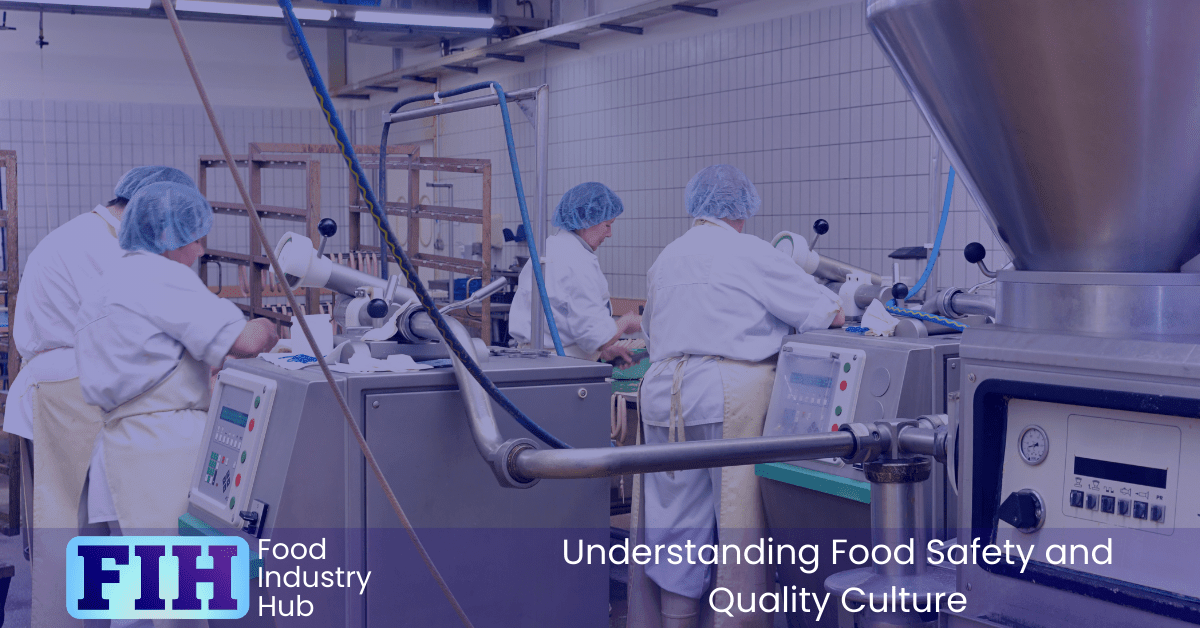
Culture and Compliance
A culture of food safety and quality is not reduceable to a culture of compliance, but a culture that places a high importance on food safety and quality values is likely to result in behaviour that is compatible with the requirements of procedures and assurance scheme requirements.
Interestingly, compliance would be coincidental rather than the purpose-driven behaviour guided by cultural influences. A strong culture of food safety and quality would value the ideals and intentions of compliance standards rather than valuing compliance directly.
The ideal state of affairs would be for the internal culture in food manufacturing businesses to value the purpose and intention of quality assurance schemes. A mature culture would not act in particular ways because compliance schemes dictate those behaviours – but because the people within the organisation believe that acting in compliance with the assurance scheme requirements would be conducive to upholding their honestly-held values and beliefs.
In effect, a strong food safety and quality culture wouldn’t result in phrases such as, “What if we got audited and they saw that?” – but might result in phrases such as, “This is the way we need to do it to make sure the quality and safety is right.”
The outcomes are highly compatible, but the motivations and values are distinct between a culture of food safety and quality and a culture of compliance.
Elements of a Strong Food Safety and Quality Culture
Essentially, a strong food safety and quality culture would align accountability across the entire organisation to food safety and quality ideals. Doing so would lead into attitudes and behaviours in service to those ideals, and social feedback would be self-reinforcing.
Values: When people really value the principals of food safety and quality, it’s hard to dissuade them from acting in the interests of both the company and consumer. Values are abstract ideals such as ‘safety’, ‘quality’, ‘convenience’, ‘security’, and ‘reputation’.
Accountability: A sense of accountability gives purpose and motivation to attitudes and behaviours.
Note – a strong food safety and quality culture aligns accountability to values and not personal consequences.
Blame/punishment approaches will not work:
If a person values their own peace and wellbeing, that might result in the attitude/stance that it’s prudent to comply with a manager’s instructions whenever there’s an appreciable risk of that manager watching them. Otherwise, whatever.
That’s the cultural dynamic you end up with if you try to motivate people using threats of punishment, or if you use an authority figure (such as an external auditor) in place of values and ideals.
Accountability should be to values:
If a person values food safety, that might result in an attitude/stance that it would be in the best interests of safety if any hazards were promptly reported on discovery – and that would be manifested in proactive escalation, which would be self-motivated without relying on management intervention. You want to get to a position where people are holding themselves accountable to values that they genuinely believe in, and those valued are in alignment with the food safety and quality ideals of the organisation.
Attitudes: Attitudes are a reflection of values, and directly shape decision-making and behaviour. Attitudes are more situationally targeted than values. It can be helpful to think in these kind of terms:
Someone [values/prioritises/idealises] food safety, so they have an [attitude/disposition/stance] that motivates their behaviour in favour of food safety outcomes.
Cultural feedback: Group reactions to expressions and behaviours organically draw a distinction between acceptable and unacceptable. Encouragement, approval, apathy, opposition, and discouragement directly influence values, attitudes, and behaviours – and it happens in real time.
Values, accountability, attitudes, behaviours, and social feedback represent the key elements of an organisation’s culture. A strong food safety and quality culture is oriented around food safety and quality values, with accountability being to those values rather than authority figures.

Importance of Food Safety and Quality Culture
Food safety and quality culture is essentially the counterpart to the documented management system.
In terms of importance, it’s helpful to think about the significance of the food safety and quality culture in relation to the documented quality management system.
The documented management system instructs people on what to do, and how to do it. The food safety and quality culture controls what people do, and why.
If a company’s culture is in conflict with its documented management system, the documented management system might as well not exist. Values are far stronger motivators than procedures. Conversely, if a food manufacturer has an internal culture accountable to food safety and quality ideals, behaviours will serve the interests of the management system, even in the absence of direct managerial intervention.
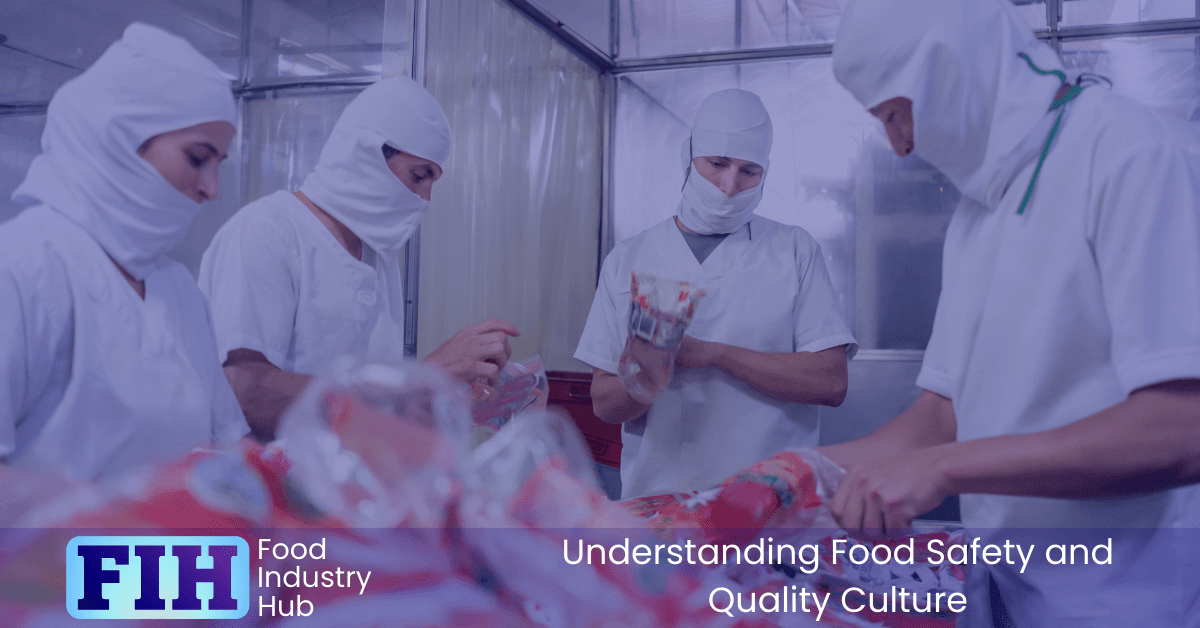
FAQ
What is food safety and quality culture?
Food safety and quality culture refers to the shared values, beliefs, attitudes, and behaviours within an organisation or that prioritise and promote the safety and quality of food products throughout all operations. It involves creating an environment where all members, from top management to frontline workers, are committed to upholding high standards of food safety and quality.
What are food safety and quality values?
Food safety and quality values are the core principles and beliefs that guide an organisation’s or individual’s approach to ensuring the safety and quality of food products. These values serve as a foundation for decision-making, behaviours, and practices related to food production, handling, and distribution. They reflect a commitment to upholding high standards and maintaining the integrity of the food supply chain.
What behaviours indicate a food safety and quality culture?
A strong food safety and quality culture is reflected in the behaviours and actions of individuals and organisations across all levels of the food supply chain. These behaviours demonstrate a commitment to upholding high standards of food safety and quality throughout the entire process of food production, handling, and distribution. Here are some key behaviours that indicate a food safety and quality culture:
Adherence to Standard Operating Procedures (SOPs): Consistently following established procedures and guidelines for food safety and quality, even in challenging or time-pressured situations.
Attention to Detail: Paying close attention to every aspect of food handling, from sourcing ingredients to storage, processing, and distribution, to prevent contamination and maintain quality.
Proactive Hazard Identification: Actively identifying and addressing potential hazards and risks that could compromise food safety and quality, and taking steps to prevent them from occurring.
Effective Communication: Communicating openly and transparently about food safety and quality concerns, sharing information about potential hazards, and promptly reporting any issues that may arise.
Continuous Training and Learning: Actively participating in training programs and seeking opportunities to learn and stay updated on the latest food safety regulations, guidelines, and best practices.
Accountability and Ownership: Taking ownership of one’s role in maintaining food safety and quality and holding oneself and others accountable for adhering to standards and best practices.
Cross-Functional Collaboration: Collaborating with colleagues from different departments to ensure a holistic approach to food safety and quality and sharing knowledge and expertise.
Prompt Response to Issues: Addressing food safety and quality concerns promptly, implementing corrective actions, and continuously monitoring to prevent recurrence.
Thorough Documentation: Maintaining accurate and detailed records of processes, procedures, and actions related to food safety and quality to ensure traceability and accountability.
Auditing and Inspections: Actively participating in internal and external audits and inspections to ensure compliance with food safety and quality standards and regulations.
Customer Focus: Prioritising customer satisfaction by consistently delivering safe, high-quality food products that meet or exceed their expectations.
Innovation and Continuous Improvement: Seeking innovative ways to enhance food safety and quality practices, implementing changes based on feedback and lessons learned, and striving for continuous improvement.
Leadership Involvement: Demonstrating visible commitment and involvement from top management in promoting and fostering a strong food safety and quality culture.
These behaviours collectively create an environment where food safety and quality are paramount and are woven into the fabric of an organisation’s operations and practices.
In Summary
Food safety and quality culture is a sub-set of an organisation’s culture – and specifically the cultural aspects that directly or indirectly impact food safety and quality.
The food safety and quality culture is made up of values, attitudes, behaviours, and social interactions – and each has an important role to play.
Culture can be a multiplier for management systems, or negate their effectiveness. A strong culture aligns the values and attitudes of employees with those of the organisation – so documented management and human behaviour are oriented toward the protection of safety and quality ideals.
From The Food Industry Hub Knowledge Centre
Featured pages from The Food Industry Hub Knowledge Centre:
Further Resources
Food Industry Hub serves the food industry with a range of digital resources for the benefit of both commercial food manufacturers and food industry professionals.
For food manufacturers, we offer integrated management systems that give every user a direct interface with your QMS.
For food industry professionals, we provide an extensive signposting service in addition to informational content we hope you’ll find useful as you face new professional challenges. We have very ambitious plans to expand the range of services offered, and currently present informational content on management, safety and quality, and professional success.

